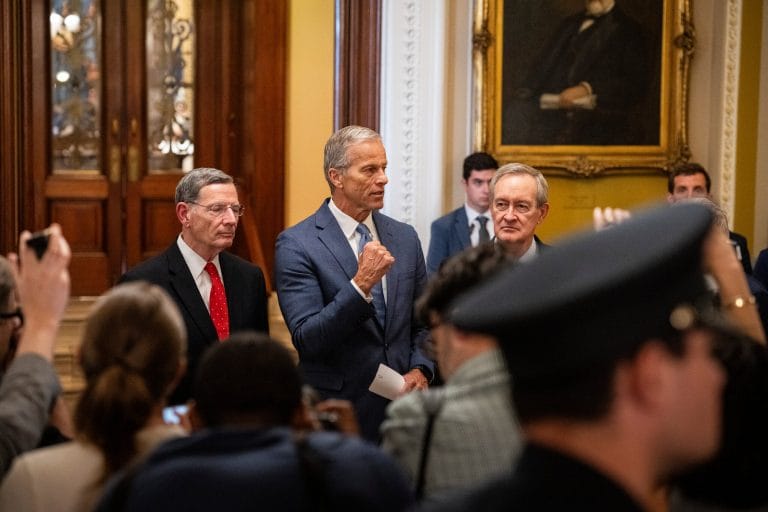🎧 Listen to This Article
President Donald Trump is making an aggressive final push to unite Republicans around his flagship tax and spending legislation, hoping to seal passage by Independence Day. The bill—dubbed “the big, beautiful deal” by Trump—aims to extend sweeping tax cuts first enacted during his 2017 term, while funding them through controversial cuts to Medicaid and other social safety net programs.
Facing resistance from both fiscal conservatives and party moderates, Trump spent Wednesday in closed-door meetings with House Republicans threatening to derail the effort at the eleventh hour.
“THE ONE BIG BEAUTIFUL DEAL IS ALL ABOUT GROWTH,” Trump posted on Truth Social. “IF PASSED, AMERICA WILL HAVE AN ECONOMIC RENAISSANCE LIKE NEVER BEFORE.”
But the political calculus is growing more complex. While the bill narrowly passed the Senate Tuesday evening—only after Vice President J.D. Vance cast a tie-breaking vote—its return to the House faces a more fractured Republican majority. Speaker Mike Johnson now faces the difficult task of bridging ideological divides within his party before the self-imposed July 4 deadline.
What’s in the Bill?
The legislation represents one of the most consequential fiscal packages in recent U.S. history. Key provisions include:
- Extension of Trump-era tax cuts for corporations, pass-through businesses, and high-income earners.
- Partial rollback of the Inflation Reduction Act’s clean energy tax credits, halting support for renewables, electric vehicles, and hydrogen initiatives.
- Deep cuts to Medicaid and other public assistance programs, potentially stripping health coverage from an estimated 12 million Americans.
- Increased funding for military and border security, signaling a return to hardline national priorities.
The nonpartisan Congressional Budget Office (CBO) estimates that the bill would add $3.3 trillion to the federal deficit over the next decade.
House Resistance Grows
Despite narrowly clearing the Senate, the bill faces turbulence in the House, where a bloc of conservatives in the House Freedom Caucus have signaled opposition over cost concerns and rushed negotiations.
“The Senate bill moved way far away from the House bill,” said Rep. Andy Harris (R-MD), chair of the Freedom Caucus, in an interview with CNBC. “We should take the time to get this right.”
A three-page memo circulated among dissenters outlines what they call “fundamental failures” in the Senate’s version of the legislation, particularly over the deficit impact and inadequate offsets for the tax extensions.
Moderate Republicans, meanwhile, have raised concerns about the scale of Medicaid cuts, warning of a potential backlash among swing voters and vulnerable constituents.
Trump’s Personal Stake
The bill marks a defining test of Trump’s legislative influence as he seeks to cement his economic agenda during a second term. His all-day lobbying effort Wednesday underscores how critical the vote is to his broader strategy of reasserting dominance over the Republican Party.
Trump’s messaging frames the bill as a growth engine, one that will “unleash American prosperity” through tax relief and deregulation. Critics argue it will deepen inequality and create long-term fiscal risks.
Political Stakes
Speaker Mike Johnson, balancing razor-thin margins in the House, expressed confidence that the bill would pass before the July 4 recess, telling Fox News, “We are at the one-yard line. We are going to run it right up the middle and score for the American people.”
However, logistical challenges could still complicate the outcome. Severe weather on the East Coast has grounded flights and may delay lawmakers returning to Washington for the vote.
“We’re tracking weather reports hour by hour,” a House leadership aide said, “because every vote counts.”
A final House vote could come as early as Wednesday evening. If passed, the bill would deliver a signature policy victory for Trump—one likely to define his second term and reshape the U.S. fiscal landscape for a generation.
But if dissenters hold the line, the collapse of the bill would expose deep fractures in Republican unity—and mark a bruising political setback for the Trump White House just six months into the new term.
Key Stats
| Policy Area | Change Proposed | Estimated Impact |
|---|---|---|
| Corporate Tax Rate | Permanently extended TCJA cuts | ~$1.2 trillion over 10 years |
| Medicaid | Major eligibility and funding reductions | ~12 million people affected |
| Clean Energy Credits | IRA tax incentives mostly repealed | ~$600 billion in reversed funding |
| Federal Deficit | Net increase by 2035 | ~$3.3 trillion (CBO projection) |
For further details, clarification, contributions, or any concerns regarding this article, please get in touch with us at editorial@tax.news. We value your feedback and are committed to providing accurate and timely information. Please note that our privacy policy will handle all inquiries.



